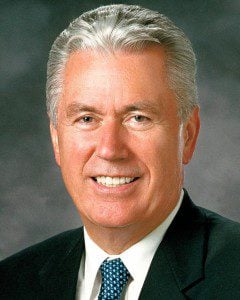Every summer, our family spends some time at a cabin in rural Utah and attend church nearby. Many of the men in the local ward earn a living through physical labor. They are strong; they are big; they have masculine presence. And then they speak, and they cry, and every member of the congregation sees that manly men, even those who won a medal in last night’s rodeo, cry and love.
One of their talks in particular has stayed with me. The speaker was a construction worker and a High Councilman –“Brother Bill Jones.” Brother Jones spoke about growing up in the ward, and how much he had loved one of his leaders in the young men’s organization. That leader, “Tony,” was only 19 years old himself one summer when he saved Bill’s life. During a camping trip, the young men were fishing and Bill became caught in the river. The river’s loud current prevented anyone from hearing his cries for help. But Tony felt a strong prompting to check on Bill, and his acting on the prompting saved Bill from drowning. The spirituality and caretaking in this episode bound these young men together. But there’s more.
After the trip, Tony took Bill home. Bill’s dad, the Bishop, was waiting with devastating news. “Tony, your parents were killed in a car accident this weekend,” he told him. Tony was the oldest child in a large family and he spent the next decades raising his parents’ children.
At the pulpit, years later, Bill wept as he described the sacrifices Tony made to care for his brothers and sisters. Tony sacrificed for them; he exercised compassion; he postponed his own marriage until his youngest sibling had graduated from high school. In Bill’s eyes, Tony was a matchless man.
My husband has taken to using the expression “woman up.” He gives presentations with relative frequency and often finds space, while encouraging audience members to act in ways that will correct hard realities, to woman up. “Why not?” he says. “I don’t want them to posture, to fight. I want them to exercise the resilience, courage, and resourcefulness that I see in women.“ Women in his audiences have been known to applaud. I applaud. I have also begun to yearn for a reimagined cultural understanding of what it means to be a man.
Jennifer Siebel Newsom—the filmmaker behind the documentary Miss Representation—and her team are finishing a new film project exploring masculinity. Its poignant working title is, The Mask You Live in. (They have launched a kickstarter campaign for funds to complete the film. Go to http://www.kickstarter.com/projects/jensiebelnewsom/the-mask-you-live-in to see a preview and learn more.) Specialists in the film describe the consequences of today’s culture of masculinity in the U.S. as disconnection and loneliness. For example, psychologist and educator Dr. Judy Chu says of boys, “Each of them is posturing in relation to the ways the other boys are posturing and they end up missing what it is they each really want, which is . . . closeness.” Here boys don’t have intimate relationships with one another because they never feel able to let down their guard for genuine encounters.
Another expert interviewed in the film, Dr. Niobe Way, explains “lack of closeness” to be the result of defining masculinity as the antithesis of femininity. When masculinity means the opposite of femininity, “[Men and boys] begin to devalue their relational parts to each other, their relational desires. If we’re in a culture that doesn’t value caring, doesn’t value relationships, doesn’t value empathy, you are going to have boys and girls, men and women, go crazy.”
That tendency to define masculinity in contrast to femininity poses a real lexical difficulty. The expression, “The opposite of man isn’t woman; the opposite of man is boy,” simultaneously reminds us to avoid the devaluation of “feminine” attributes while it emphasizes the entrenchment of notions about masculinity. Whether someone believes that outside of culture and physical difference men and women would share personality and character—or, in other words, that beyond culture masculinity and femininity could cease to exist—no one can deny the strong impact these notions wield in the real world. One of my favorite disruptions to thinking of masculinity and femininity as opposites is a scene near the end of Disney’s Mulan. To save their Emperor, male Chinese soldiers sneak into the palace dressed as women. As the music swells, they sing:
We must be swift as the coursing river
(To be a man)
With all the force of a great typhoon
(To be a man)
With all the strength of a raging fire
Mysterious as the dark side of the moon
I am thrilled that Newsom and others at MissRepresentation.org are making their film. I want men and boys to experience a more ennobling and fulfilling vision of masculinity. I also believe that society as a whole will never be a wholesome place for women until we have worked through more salutary perspectives on men and manhood. Harvey Mansfields’ Manliness (2006), for example, argues for manliness defined as political courage, the courage to challenge conventional beliefs, to replace belief in manliness as aggression.
The Mask You Live In’s focus on men needing to feel and receive empathy and connection reminds me of the beauty I see in LDS testimony meetings. When LDS men speak in church, they often cry and they express their deep love for their families and ward members, including close male friends.
The first counselor to the stake president was in my last ward. When he bore his testimony, he often had trouble speaking because he cried so passionately as he spoke of his love for his children and the joy he had found through being a father. What an antidote to the problems Newsom’s work has helped to identify. The LDS men I see at church are American, and they negotiate definitions and stereotypes of masculinity just as other Americans must. But I suspect that testimony meetings, elders’ quorum, home teaching, and other callings give them a head start in experiencing a more emotional and connected masculinity. As Jackson Katz says in The Mask You Live In, “We need to redefine strength in men not as the power over other people but as forces for justice. We’re giving men a great gift when we teach them how to integrate caring and compassion into strength.”











